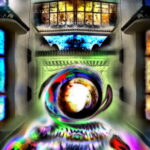-
📜. The Qur’an in the Maziramy Mythos — Reverence, Readers, and the Light of Nour
A respectful addendum requested by the author: addressing the Prophet (peace be upon him) as Nour — “Light” — within the mythos. This document preserves tone and reverence while aligning the Qur’an’s role to the story world.1. Invocation of Reverence
In the Maziramy mythos, the Qur’an is always treated as the luminous, living revelation it is. Its presence is sacred and inviolable. When characters speak of the Prophet in relation to the Qur’an and to guidance, they refer to him respectfully by the chosen epithet Nour (“Light”) — an honorific that emphasizes his role as a bearer of guidance and illumination.
The text emphasizes that all praise, humility, and devotion belong to God All‑Mighty, the Creator. The Qur’an is not an object of idolization but a divine speech that draws hearts toward remembrance, humility, and action.2. Two Ways of Approaching the Book: Heart vs. Ego
Within the mythos, characters (and forces) approach the Qur’an in fundamentally different ways. This contrast is central to how the artifact functions across the Ariphes.
A. The Devout Approach — Contemplation and Submission
Those who come with humility and sincere faith experience the Qur’an as guidance and healing.
* Contemplation: The verses open like doors; meanings unfold, not as puzzles to be bent to will, but as light that clarifies the heart.
* Protection: Recitation and reflection become shields; the sincere heart finds solace and a refuge from delusions.
* Transformation: Pain, envy, and despair are eased; the soul is re-centered on remembrance of God.
These readers are often represented by characters like Haitham and other devout allies — people whose inner trust grants the Qur’an its true effect.
B. The Corrupt Approach — Ego, Magic, and Misuse
Some beings—magicians who worship their own craft, devils who celebrate cunning, or those intoxicated by power—approach the Qur’an with self at the center.
* Ego‑Reading: They read the text to justify themselves, to amplify their power or to bind the Word to their will. In doing so, the sacred script becomes a mirror that reflects their corruption back onto them.
* Instrumentalization: Verses are exploited as tools; invocations become commands to bend truth rather than to submit to it.
* Backfire: The Qur’an’s light does not bless false pride. In the mythos, attempts to weaponize the Book for selfish ends produce disorder: runes crack, sigils fail, and the reader’s heart is exposed.
This misuse is a recurring thematic caution: divine speech cannot be owned.3. Nour (the Prophet) — The Luminous Guide
The figure called Nour in the Maziramy mythos stands as an emblem of prophetic light and guidance. Characters who recall the Prophet as Nour see in him a model of humility, steadfastness, and compassion.
* Nour’s Example: The prophet’s teachings (as represented in the mythos) are not treated as mere lore but as living examples of submission to God’s will — mercy, justice, and patient endurance.
* Narrative Function: Invoking Nour reminds characters of a standard higher than themselves. Even seasoned mythic beings—vampires, djinn, and technomancers—measure themselves against that light.
The story consistently avoids irreverence; references to Nour are framed with respect and gratitude.4. Dramatic Uses in the Maziramy Plot
A few practical ways the Qur’an (and the idea of Nour) function in scenes:
* As a Test: Characters who attempt to use the Book for ego get exposed—helpful for revealing villains and hypocrites.
* As Refuge: Allies in peril find protection through sincere recitation and remembrance.
* As Compass: The Book’s verses guide decisions that align personal power with moral restraint (Euryeth’s ethical feeding, Haitham’s deflection of the evil eye, etc.).
* As Mirror: The Qur’an reveals true intentions. Those who read it to feed themselves see their corruption magnified.5. Tone & Sensitivity
This document treats the Qur’an and prophetic references with solemn respect. It is intentionally careful to:
* Avoid treating the Qur’an as a mere magical prop.
* Emphasize that its power in the mythos derives from God, not from characters.
* Use the epithet Nour reverently and consistently when characters refer to the Prophet (peace be upon him) in narrative or symbolic contexts.6. Sample Scene Hooks
1. The Magician’s Hubris: A magician attempts to read a verse as a spell to bind an enemy; smoke and sigils fail, and the magician’s instruments implode—the Book’s light proves incompatible with ego.
2. The Shelter of the Recital: Haitham stands at a city gate, reciting; the crowd’s fear recedes as envy and malice falter.
3. Euryeth’s Reflection: Euryeth reads late at night and is reminded of Nour’s humility; he chooses mercy instead of revenge.Closing Note
Within the Maziramy mythos, the Qur’an remains both the deepest test and the greatest mercy. It divides those who seek to be elevated by it from those who seek to elevate themselves through it. Invoking Nour—the prophetic light—becomes a narrative anchor: a reminder that true guidance is given, not made, and that humility before God All‑Mighty is the ultimate strength.
About Me

Euryeth
Artist
Omar Alami Known As Euryeth, Artist and Digital Marketer, Writer, Tactician, Musician … I Think The Abilities Of People Transcend Definitions in Words and Labels Among Other Things, I Do Have a Purpose and I Do Have A Goal and A Plan, And I Will Do My Ultimate Best In Achieving It While Being a Lotus of Wealth and Knowledge in Order To Shape a Better Future, To Have Value and To Be Able To Actually Help In Materialistic Verse and In The Virtual and Spiritual and Emotional …
Media
Photos
Videos
Audios
Files
Recent Posts













